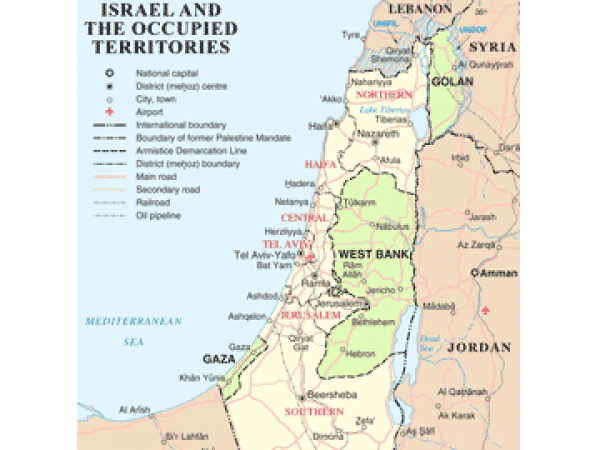Why South Africa must end trade with illegal Israeli settlements

South Africa ruffled political feathers in April this year, after it made it unlawful for Israeli settlement products sold locally to be labelled as “made in Israel”. All products made by Israeli businesses operating illegally in the settlements must now be labelled according to where they were produced in the Occupied Palestinian Territories. This is in accordance with international law and South African foreign policy.
The labels will now read: “West Bank: Israeli Goods”, “East Jerusalem: Israeli Goods”, and “Gaza: Israeli Goods”. South Africa, like all countries, does not recognise the settlements as legal Israeli territory. Labelling has provided a means for distinguishing settlement goods from those of Israel proper.
South Africa must now meet its international legal obligations, and end all trade with the illegal Israeli settlements.
The organisation, Open Shuhada Street, is making this call at a time when hopes for a peaceful and equitable resolution for both Palestinians and Israelis are becoming distant. At the moment, the two-state solution seems almost increasingly difficult to achieve. The Israeli elections that took place in January this year have resulted in a considerable rightward lurch in Israeli politics. The Jewish Home, for example, gained the fourth most seats in the Knesset, giving it a total of 12 seats out of 120 in the Knesset. Its leader, Naftali Bennet, is the Minister of Economy and Trade and has come out in public advocating that Israel annex Area C of the West Bank - almost 60% of what is supposed to be a part of a future Palestinian state.
Settlement expansion has increased exponentially under the Netanyahu government over the last two years: after Palestine’s successful Statehood bid at the UN, the Israeli government issued plans for the construction of a further 3,000 housing units in the West Bank. According to a report titled “Trading Away Peace: How Europe Helps Sustain Illegal Settlements”, settlement construction over the last two years in the West Bank has increased by 16,000 new housing units that have either been announced or approved. According to the report, the settler population has almost doubled since the Oslo Accords. This trend cannot be ascribed to “security reasons”, as Israel often refers to.
The fate of Jerusalem - East and West Jerusalem being future capitals of the Palestinian and Israeli states respectively - is of critical concern, as it is widely acknowledged as a “final status” component in finding peace. In other words, without East Jerusalem as the capital of a Palestinian state, there will more than likely be no just resolution to the conflict possible. However, according to an EU Heads of Mission Report on Jerusalem (2011), Israel’s actions regarding East Jerusalem portend a very different Israeli vision for the city than what it professes in public.
The expanding settlements pose a significant threat to a just resolution to the conflict. The United Nations and International Court of Justice have confirmed that the settlements are illegal under international law. In addition to this, the settlement enterprise is characterised by a swathe of other legal violations, such as denying the Palestinians their right to self-determination, restrictions on freedom of movement, home and property demolitions and the denial of access to Palestinians of their natural resources such as water, and the illegal extraction of those resources by settlement businesses. These and further legal violations, all go against Israel’s legal obligations as the Occupying Power in the West Bank.
Under international law, where a state violates the law, other states are obliged not to provide recognition or assistance to furthering the violation and to work together to bring the vagrant state in line with the law. However, by trading with the settlements, South Africa is giving legal recognition and assistance to the illegal settlements. This is a contradictory policy and South Africa must, if it genuinely seeks a just resolution of the conflict along the lines of the two-state solution, work towards opposing such activities.
By providing settlement businesses with access to external markets, states and businesses are providing them with financial resources for private economic gain and for settlement maintenance and development through the respective Israeli municipalities that govern in the West Bank - with the effect that the settlements are becoming ever more entrenched. According to figures submitted by the Israeli government to the World Bank, settlement businesses export in the region of 220 million Euros (over R2.6 bn) to the European Union as opposed to just 15 million Euros (just over R179m) of Palestinian produce.
The settlement economy, however, is intertwined and connected to the economy of Israel proper. This makes it difficult to separate the two economies and take effective policy action. Nonetheless, a number of options are available to governments to pressure Israel into withdrawing from the West Bank, such as proper labelling and denying settlement exports preferential access to external markets. However, Israel consistently finds ways around these policies and these options still permit revenue flows back to the settlements, furthering their entrenchment. A consumer-led boycott can only work so far: how do consumers boycott materials imported from the settlements for industrial purposes?
If South Africa is to fully meet legal obligations and rectify the contradictions within its foreign policy towards Israeli settlements, it must exert its influence on the settlements and ban all trade with them.
Jonathan Dockney is the coordinator of Open Shuhada Street.
Support independent journalism
Donate using Payfast

Don't miss out on the latest news
We respect your privacy, and promise we won't spam you.

This article is licensed under a Creative Commons Attribution-NoDerivatives 4.0 International License.
